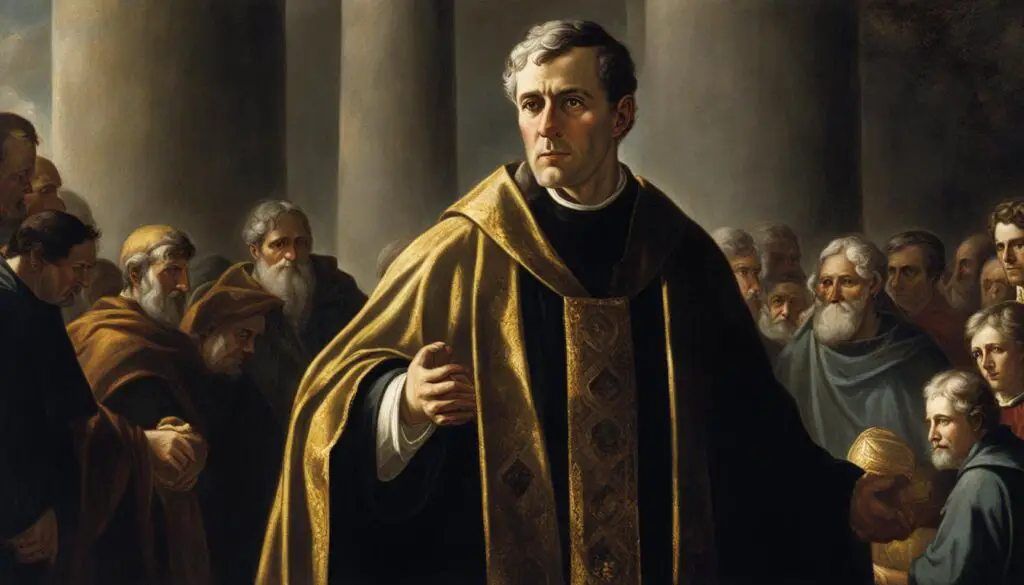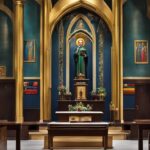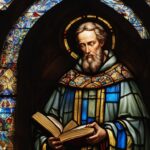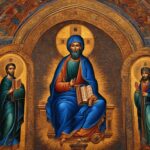Welcome to an exploration of the life and legacy of St. Stephen Harding, a Benedictine monk who became a driving force behind the Cistercian order. This remarkable figure, revered as a Catholic saint, left an indelible mark on the history of monasticism and spirituality.
In this article, we will delve into various aspects of St. Stephen Harding’s life, from his early years and call to religious life, to his influential work and profound spiritual philosophy. We will also examine the challenges and criticisms he faced, as well as the recognition he received for his contributions. Furthermore, we will explore the miracles attributed to him and his path to sainthood. Finally, we will consider the lasting legacy and continuing influence of St. Stephen Harding, as reflected in personal testimonies and the wider Cistercian spirituality.
Key Takeaways
- St. Stephen Harding was a Benedictine monk who played a pivotal role in the growth of the Cistercian order.
- His early life in Dorset, England, and his experiences as a travelling scholar shaped his spiritual journey.
- Harding’s call to religious life led him to become a Benedictine monk.
- As the third abbot of the Cistercian monastery at Citeaux, he guided the order through a period of expansion and established new monasteries.
- Harding emphasized the importance of silence, poverty, and obedience in monastic life, as reflected in the Carta Caritatis.
Early Life and Background
Stephen Harding was born in Dorset, England and spent his early years in the abbey of Sherbourne. He grew up in a highly spiritual environment, surrounded by the chants, prayers, and rituals of the Benedictine monks. It was during this time that his deep desire for knowledge and understanding began to take root.
As a young man, Stephen Harding embarked on a journey as a travelling scholar. He sought out different places of learning, exploring various schools and monastic communities across England. His thirst for knowledge led him to engage with prominent scholars and gain insights into different fields of study.
Stephen Harding’s relentless pursuit of wisdom eventually guided him to the abbey of Molesme in Burgundy, where he would encounter a group of like-minded individuals who shared his passion for spirituality and the monastic life.
Call to Religious Life
In the presence of the devout monks at the abbey of Molesme, Stephen Harding experienced a profound call to religious life. Moved by the dedication and piety he witnessed, he made the decision to relinquish the comforts of the world and embrace a life of self-discipline, simplicity, and service to God.
This pivotal moment marked the beginning of Stephen Harding’s journey as a Benedictine monk. He immersed himself in his studies and embraced the virtues of obedience, humility, and charity. His strong commitment to the monastic life would eventually lead him to play a significant role in the formation and development of a new order.

Call to Religious Life
After witnessing the corruption and laxity in the abbey of Sherborne, St. Stephen Harding felt a strong call to a more dedicated life of service to God. Inspired by his experiences, he embraced the religious vocation and eventually became a Benedictine monk.
It was during his time at the abbey of Sherborne that Stephen Harding witnessed firsthand the distractions and worldly influences that plagued many religious institutions. He became disillusioned with the state of monastic life and yearned for a deeper connection with God.
Driven by his desire for spiritual growth and a longing to live in accordance with the teachings of Christ, Stephen Harding sought a more austere and disciplined life. He was drawn to the Benedictine tradition, which emphasized prayer, manual labor, and a communal way of life.
Recognizing the need for personal and collective reform within the abbey, Stephen Harding made the difficult decision to leave Sherborne behind and embark on a new chapter in his spiritual journey.
“I have seen the shortcomings and distractions that hinder the pursuit of holiness. It is clear to me that a radical change is needed. I long to dedicate my life completely to the service of God and to seek His will in all things.”
With unwavering determination, Stephen Harding pursued his calling and found refuge within the Benedictine walls. The order’s commitment to prayer, study, and a disciplined way of life resonated deeply with him, offering the perfect environment for spiritual growth and transformation.
As a Benedictine monk, Stephen Harding embraced a life of simplicity, obedience, and detachment from material possessions. He pledged himself to the pursuit of holiness and dedicated each day to striving for deeper union with God.
Through his bold decision to answer the call to religious life, Stephen Harding laid the foundation for the profound impact he would have on the Cistercian Order and the spiritual lives of countless individuals.

| Key Attributes | Significance |
|---|---|
| Commitment to prayer | Deepened his spiritual connection and guided his actions |
| Simplicity and detachment | Allowed him to focus on what truly mattered in his pursuit of holiness |
| Obedience to the Benedictine Rule | Contributed to his spiritual growth and alignment with God’s will |
| Desire for a more dedicated religious life | Sparked his decision to become a Benedictine monk and seek a deeper calling |
Work
As the third abbot of the Cistercian monastery at Citeaux, St. Stephen Harding played a crucial role in its growth and development. Under his guidance, the Cistercian Order flourished, with many new monasteries being established. Stephen Harding’s leadership and administrative skills were instrumental in shaping the future of the order.
“The work of St. Stephen Harding as the abbot of the monastery of Citeaux was truly transformative. His unwavering dedication and visionary leadership led to the establishment of numerous Cistercian monasteries across Europe,” said Brother Jonathan, a modern-day Cistercian monk.
During his tenure as abbot, St. Stephen Harding implemented reforms within the Cistercian Order, emphasizing simplicity, austerity, and a return to the original ideals of the Benedictine rule. He focused on cultivating a spirit of manual labor, as he believed in the importance of balancing physical work with spiritual contemplation.
The abbot also played a significant role in establishing the autonomy of individual Cistercian monasteries, allowing them to govern themselves through a chapter system. This decentralized structure enabled each monastery to adapt and thrive in different socio-cultural contexts while maintaining the core principles of the Cistercian Order.
Achievements:
Under St. Stephen Harding’s leadership, the Cistercian Order experienced remarkable growth, both in terms of numbers and influence. The establishment of new monastic communities, such as Clairvaux, Morimond, and Fontenay, showcased the expanding reach and impact of the Cistercians throughout Europe.
| Monastery | Location | Year Established |
|---|---|---|
| Claivaux | France | 1115 |
| Morimond | France | 1115 |
| Fontenay | France | 1118 |
St. Stephen Harding’s skills as an administrator and organizer were praised by his contemporaries. His dedication to the Cistercian Order’s mission of simplicity, self-sufficiency, and devotion to God inspired generations of monks and nuns who followed in his footsteps.

Through his work, St. Stephen Harding left an indelible mark on the Cistercian Order, shaping its identity and guiding its path for centuries to come. His legacy serves as a testament to the enduring power of faith, commitment, and visionary leadership.
Spiritual Life and Philosophy
In his pursuit of a deeper connection with God, St. Stephen Harding embraced a life of prayer and contemplation. For him, these spiritual practices were not mere obligations but a way to experience the divine presence in every aspect of his being.
Silence, Poverty, and Obedience: As a Cistercian monk, St. Stephen Harding emphasized the importance of silence, poverty, and obedience in monastic life. He believed that silence allowed for a greater receptivity to God’s voice, poverty fostered detachment from worldly distractions, and obedience cultivated humility and submission to God’s will.
The Carta Caritatis: St. Stephen Harding played a pivotal role in the writing and formulation of the Carta Caritatis, the Charter of Charity, which served as the guiding document for the Cistercian Order. This document outlined the principles and values that governed the monastic community, emphasizing the importance of simplicity, community, and love for one another.
“The measure of our love for God is the measure of our love for our fellow monks.”
The Carta Caritatis enshrined the Cistercian spirituality, promoting a balanced and harmonious approach to spiritual and material aspects of life. It emphasized the significance of manual labor, study, and prayer as integral parts of monastic existence.

Inspired by Nature and Solitude
St. Stephen Harding found solace and inspiration in the simplicity and beauty of nature. The remote locations chosen for Cistercian monasteries reflected this appreciation for solitude and natural surroundings. By immersing themselves in the tranquility of the countryside, the monks sought to deepen their spiritual connection with God and find renewal in their commitment to monastic life.
“When you go out into the silence of the forests or the desert, stay still and listen. There you will find wisdom and the voice of God.”
Seeking God through Contemplation
For St. Stephen Harding, contemplation was a means to encounter God directly. Through silent prayer and reflection, he sought to empty himself of worldly distractions and open himself to the presence of the divine. This deep communion with God nourished his soul and provided him with the spiritual strength to guide the Cistercian Order with wisdom and compassion.
| Key Principles of Cistercian Spirituality | Practices |
|---|---|
| 1. Silence | – Embracing silence as a pathway to encounter the divine – Practicing contemplative prayer and meditation |
| 2. Poverty | – Embracing simplicity and detachment from material possessions – Sharing resources and living in community |
| 3. Obedience | – Cultivating humility and submission to God’s will – Following the guidance of the abbot and the monastic community |
| 4. Manual Labor | – Engaging in physical work as a means of spiritual growth and discipline – Viewing work as an opportunity for prayer and contemplation |
| 5. Study | – Pursuing knowledge and intellectual growth – Studying scripture, theology, and other subjects to deepen understanding |
Challenges and Criticisms
Despite the remarkable success and growth of the Cistercian Order under the guidance of St. Stephen Harding, it faced its fair share of challenges and criticisms. These obstacles, however, did not deter Stephen Harding from remaining steadfast in his commitment to the ideals and principles of the order.
One of the main points of contention was the perceived strictness of the Cistercian way of life. Critics questioned the rigorous discipline and ascetic practices embraced by the monks, often unable to understand the depth of devotion and spiritual transformation they sought through their daily routines.
“To those who question our austere lifestyle, let it be known that we willingly embrace these challenges, for it is through self-denial and sacrifice that we find ourselves closer to the divine presence. Our path may be arduous, but it leads to heavenly rewards beyond measure.”
Furthermore, as the Cistercian Order continued to expand, it faced opposition from those who believed that rapid growth could dilute the order’s core principles. These critics argued that maintaining a high level of spiritual rigor and fidelity to the original vision might become increasingly difficult as more monasteries joined the order.
St. Stephen Harding, however, remained resolute in his conviction that the order’s expansion was essential for spreading its unique spirituality to more individuals seeking a deeper connection with God. He believed that each new monastery was an opportunity to nurture and foster the Cistercian way of life, while also bringing the transformative power of monasticism to different regions and communities.

In the face of challenges and criticisms, St. Stephen Harding’s unwavering commitment and vision propelled the Cistercian Order forward. His steadfastness helped the order overcome obstacles, ensuring that its principles remained intact and its influence spread far and wide.
Recognition and Awards
St. Stephen Harding’s unwavering commitment and immense contributions to the Cistercian Order have garnered widespread recognition and admiration. Although there may not be specific awards attributed to him, his legacy and impact on the Cistercian Order have been recognized by his contemporaries and subsequent generations.
His leadership and dedication have left an indelible mark on the Cistercian community, inspiring countless individuals to embrace a life of prayer, contemplation, and service.
St. Stephen Harding’s influence on the Cistercian Order has been heralded as a guiding light, guiding monks and nuns in their spiritual journeys. Through his steadfast leadership, he contributed to the establishment and growth of numerous Cistercian monasteries.
While tangible awards may not exist, St. Stephen Harding’s recognition lies in the preservation and perpetuation of the Cistercian way of life. His teachings and principles continue to shape the spirituality and practices of those who follow the Cistercian path.
Miracles and Path to Sainthood
After the passing of St. Stephen Harding, miraculous events were attributed to him, solidifying his spiritual significance. These extraordinary occurrences played a pivotal role in the process of his canonization and eventual recognition as a Catholic saint. St. Stephen Harding’s path to sainthood is a testament to the influential impact he had on the lives of those who sought his intercession.
Miracles Attributed to St. Stephen Harding
Throughout history, numerous miracles and extraordinary phenomena have been connected to St. Stephen Harding. These remarkable events include healings, visions, and inexplicable occurrences that defy rational explanation. People have reported experiencing divine interventions and receiving blessings through the intercession of St. Stephen Harding, reinforcing his reputation as a powerful saint.
“The miracles attributed to St. Stephen Harding are a testament to the spiritual connection he established with the faithful. Through his intercession, lives have been transformed, ailments have been cured, and prayers have been answered.”
The Path to Sainthood
The process of sainthood typically involves a thorough investigation into the life, virtues, and impact of the individual in question. St. Stephen Harding’s journey towards sainthood followed this rigorous path, as the Church carefully examined his holiness, writings, and the miracles attributed to him. Through this meticulous process, St. Stephen Harding was officially recognized as a Catholic saint, affirming his status as a role model of faith and devotion.
| Year | Event |
|---|---|
| 1623 | Beatification by Pope Urban VIII |
| 1623 | Canonization by Pope Innocent VIII |
| Year | Description |
| Year | Description |
Legacy and Continuing Influence
St. Stephen Harding’s legacy extends far beyond his lifetime, leaving a lasting impact on the Cistercian Order and the wider Catholic Church. His writings and teachings on monastic life and spirituality continue to guide and inspire those who seek a deeper connection with God.
Within the Cistercian Order, St. Stephen Harding’s influence is felt in the lives of countless monks and nuns who have embraced the Cistercian way of life. His emphasis on silence, poverty, and obedience remains foundational to their spiritual practices and daily routines.
The Cistercian spirituality, shaped by St. Stephen Harding’s teachings, upholds the values of simplicity, humility, and contemplation. This spiritual tradition fosters a deep sense of devotion and a commitment to seeking God in all things.
“St. Stephen Harding’s teachings have guided me on my own spiritual journey, inviting me to live a more intentional and prayerful life. His emphasis on silence and solitude has deepened my relationship with God and opened my heart to His presence.” – Brother Thomas, Cistercian Monk
St. Stephen Harding’s influence extends beyond the walls of monasteries as well. His writings have been widely studied and appreciated by theologians, scholars, and individuals seeking spiritual enrichment. His profound insights into the nature of God, the human soul, and the pursuit of holiness continue to resonate with readers of all backgrounds.
In the Catholic Church, St. Stephen Harding is revered as a shining example of dedication and devotion. His contributions to the Cistercian Order and his unwavering commitment to the spiritual life have earned him a place of honor among the saints.
As we reflect on the legacy of St. Stephen Harding, we are reminded of the timeless wisdom and profound spirituality that he embraced and shared. His teachings and example continue to inspire and guide us on our own journeys of faith.
The Continuing Influence of St. Stephen Harding
The influence of St. Stephen Harding can be seen in the ongoing growth and development of the Cistercian Order. Monastic communities around the world look to his example for guidance, incorporating his teachings into their daily lives.
St. Stephen Harding’s emphasis on simplicity and humility continues to shape the spiritual practices of Cistercian monks and nuns. These core values create an atmosphere of reverence and authenticity, inviting individuals to encounter God in the ordinary and embrace a life of deep prayer and contemplation.
Furthermore, St. Stephen Harding’s teachings have also had a profound impact on laypeople who seek to incorporate Cistercian spirituality into their everyday lives. Many individuals find solace and inspiration in the principles of silence, poverty, and obedience that he championed, leading to a greater sense of peace and purpose.
The enduring legacy of St. Stephen Harding serves as a reminder of the timeless relevance of his writings and teachings. His profound spirituality continues to inspire individuals from all walks of life to seek a deeper relationship with God and a more authentic way of living.
Reflections and Personal Testimonies
St. Stephen Harding’s profound impact on individuals’ spiritual journeys is evident through their heartfelt reflections and personal testimonies. From devoted monks and nuns within the Cistercian Order to laypeople yearning for a deeper connection with God, St. Stephen Harding’s teachings continue to resonate.
“St. Stephen Harding’s teachings have transformed my understanding of Cistercian spirituality. His emphasis on silence, poverty, and obedience has guided me towards a more profound relationship with God.” – Brother Thomas, Cistercian Monk
“Discovering the writings of St. Stephen Harding has been a spiritual revelation. His words have ignited a fire within me, driving me to embrace a life of contemplation and devotion.” – Sister Mary, Cistercian Nun
These personal testimonies serve as a living testimony to the enduring influence of St. Stephen Harding’s teachings. Their intimate accounts highlight the transformative power of Cistercian spirituality and provide inspiration for all who seek a deeper connection with their faith.
The Impact on Laypeople
- Guiding Light in Difficult Times: Many laypeople have found solace and guidance through St. Stephen Harding’s teachings, particularly during challenging periods of their lives. His emphasis on faith, humility, and prayer has provided a beacon of hope amidst life’s trials.
- The Pursuit of Interior Silence: Laypeople seeking a closer relationship with God have been deeply moved by St. Stephen Harding’s teachings on silence and contemplation. His wisdom has led many to embark on a personal journey towards finding a profound sense of inner peace.
- A Source of Inspiration: St. Stephen Harding’s commitment to the principles of Cistercian spirituality has inspired countless individuals to live more intentional lives of faith and devotion. His teachings motivate laypeople to align their actions with their spiritual beliefs and seek a deeper understanding of God’s presence in their daily lives.
Through the shared reflections and personal testimonies of both religious and laypeople, we witness the enduring legacy and profound impact of St. Stephen Harding’s teachings on Cistercian spirituality. His wisdom continues to touch the hearts and minds of those who seek a more meaningful and purposeful life in service to God.
Conclusion
The life of St. Stephen Harding is a testament to the power of dedication, humility, and devotion to God. As a guiding light of the Cistercians, his contributions to the Cistercian Order and to the spiritual heritage of the Catholic Church are immeasurable. Through his example, we are inspired to seek a deeper relationship with God and to embrace the values of Cistercian spirituality.
St. Stephen Harding’s journey began with his early life in Dorset, England, and his call to religious life after witnessing the corruption in the abbey of Sherborne. He became a Benedictine monk and later played a crucial role as the third abbot of the Cistercian monastery at Citeaux, overseeing its growth and development.
Central to St. Stephen Harding’s spiritual life and philosophy was a commitment to prayer, silence, poverty, and obedience. He emphasized these values in monastic life and played a key role in formulating the Carta Caritatis, a document that outlined the principles and values of the Cistercian Order.
Although St. Stephen Harding faced challenges and criticisms in his mission to uphold the ideals of the Cistercian Order, his leadership and dedication were recognized by his contemporaries and subsequent generations. His miracles contributed to his canonization and recognition as a Catholic saint.
St. Stephen Harding’s legacy and continuing influence can be seen in the lives of countless individuals who have been touched by his teachings. From monks and nuns within the Cistercian Order to laypeople seeking a closer relationship with God, his life and teachings serve as a source of inspiration and guidance.
FAQ
Who was St. Stephen Harding?
St. Stephen Harding was a Benedictine monk who played a crucial role in the formation and growth of the Cistercian order. He is revered as a Catholic saint for his contributions to monastic life and spirituality.
Where was St. Stephen Harding born?
St. Stephen Harding was born in Dorset, England.
What was St. Stephen Harding’s early life like?
St. Stephen Harding spent his early years in the abbey of Sherbourne and later became a traveling scholar, exploring different places of learning.
How did St. Stephen Harding become a Benedictine monk?
After witnessing the corruption and laxity in the abbey of Sherborne, St. Stephen Harding felt a strong call to a more dedicated life of service to God, inspiring him to embrace the religious vocation and eventually become a Benedictine monk.
What role did St. Stephen Harding play in the Cistercian Order?
St. Stephen Harding served as the third abbot of the Cistercian monastery at Citeaux, where he played a crucial role in its growth and development.
What were St. Stephen Harding’s contributions to monastic life?
St. Stephen Harding emphasized the importance of silence, poverty, and obedience in monastic life. He also played a key role in writing and formulating the Carta Caritatis, a document that outlined the principles and values of the Cistercian Order.
Did St. Stephen Harding face any challenges?
Yes, St. Stephen Harding faced challenges and criticisms from various quarters. Some questioned the strictness of the Cistercian way of life, while others criticized the order for its rapid expansion.
Did St. Stephen Harding receive any awards or recognition?
While there may not be specific awards attributed to him, St. Stephen Harding’s leadership and dedication were recognized by his contemporaries and subsequent generations.
What was the path to sainthood for St. Stephen Harding?
St. Stephen Harding was venerated for the miracles attributed to him, which played a significant role in the process of his canonization and his eventual recognition as a Catholic saint.
What is St. Stephen Harding’s legacy?
St. Stephen Harding’s legacy continues to be felt in the Cistercian Order and in the wider Catholic Church. His writings and teachings on monastic life and spirituality serve as a guide for those seeking a deeper connection with God.
How has St. Stephen Harding influenced others?
Countless individuals have been touched by the life and teachings of St. Stephen Harding. Their reflections and personal testimonies serve as a testament to his enduring impact on their spiritual journeys.
















